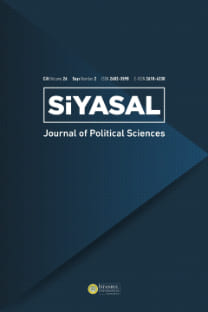Yumuşak Güç ve Kamu Diplomasisi: Kavramsal Bir Değerlendirme
Bu makale uluslararası siyasetin iki yeni kavramını -yumuşak güç ve kamu diplomasisi- eleştirel bir bakış açısıyla ele
Anahtar Kelimeler:
Public diplomacy, Soft power, Media, Legitimacy, National interest
Soft Power and Public Diplomacy: A Conceptual Assessment
This paper is a critical assessment of two novel concepts on international politics: soft power and public diplomacy. It
___
Barnett, M. and Raymond D. (2005). ‘Power in International Politics’, International Organization, 59 (1), 39-75.Butterfield, H. (1966). “The New Diplomacy and Historical Diplomacy”, in Herbert Butterfield and Martin Wight (eds) Diplomatic Investigations: Essays in the Theory and International Politics, (London: George Allen and Unwin Ltd), pp.181-192.
Carr, E. H. (2001). The Twenty Years’ Crisis, 1919-1939, (New York: Perennial). Cull, N. (2009). “How we got here” in Philip Seib (ed), Toward a New Public Diplomacy: Redirecting US Foreign Policy, (New York: Palgrave Macmillan), pp. 23-48.
Cummings, B. (1992). ‘The Wicked Witch of the West is Dead. Long Live the Wicked Witch of the East’, in Michael J. Hogan (eds). The End of the Cold War: Its Meaning and Implications, (Cambridge: Cambridge University Press), pp. 87-101.
Dryzek, J. (2010). Foundations and Frontiers of Deliberative Democracy, (Oxford: Oxford University Press).
Ferguson, Y. & Richard M. (1996). ‘The Past as Prelude to the Future? Identities and Loyalties in Global Politics’, in Yosef Lapid and Friedrich Kratochwil (eds) The Return of Culture and Identity in IR Theory, (London: Lyne Rienner Publishers), pp. 21-44.
Gaddis, J. L. (1982). ‘George Kennan and the Strategy of Containment’, in Joh Lewis Gaddis, Strategies of Containment: A Critical Appraisal of Postwar American National Security Policy, (Oxford: Oxford University Press), pp. 25-53.
Gaddis, J. L (1992). ‘The Cold War, the Long Peace and the Future’, in Michael J. Hogan (eds). The End of the Cold War: Its Meaning and Implications, (Cambridge: Cambridge University Press), pp. 21-38.
Held, D. & Antony M.G. (1993). ‘Globalization and the Liberal Democratic State’, Government and Opposition, 28 (2), 261-288.
Kissinger, H. (1957). Nuclear Weapons and Foreign Policy, (New York: Council on Foreign Relations)
Kennedy, P. (1987). The Rise and Fall of Great Powers, (New York: Vintage Books).
Keohane, R., Stephen M. & Andrew M. (2009). ‘Democracy-Enhancing Multilateralism’, International Organization, 63, 1-31.
Lukes, S. (1974). Power: A Radical View, (New York: Macmillan).
Milburn, T., Philip S. & Richard H. (1982). ‘Perceiving the Other’s Intentions’, in Charles Kegley and Pat McGowan, Foreign Policy: USA/USSR, (London: Sage Publications).
Morgenthau, H. (1948). Politics Among the Nations: The Struggle for Power and Peace, (New York: Alfred A. Knopf), pp. 80-107.
Nye, J. (2000). Understanding International Relations: An Introduction to Theory and History, (New York: Longman).
Nye, J. (2004). Soft Power: The Means to Success in World Politics, (New York: Public Affairs).
Nye, J. (2004). ‘Soft Power and American Foreign Policy’, Political Science Quarterly, 119 (2), 255-270.
Nye, J. (2004). ‘Decline of America’s Soft Power: Why Washington Should Worry’, Foreign Affairs, pp. 16-20.
Nye, J. (2002). The Paradox of American Power: Why the World’s Only Superpower Can’t Go It Alone, (Oxford: Oxford University Press), pp. 15.
Nye, Joseph (2011). The Future of Power, (New York: Public Affairs).
Ruggie, J. G. (1982). ‘International Regimes, Transactions and Change: Embedded Liberalism in the Post-War Economic Order’, International Organization, 36(2), 379-415.
Seib, P. (2009). Toward a New Public Diplomacy: Redirecting US Foreign Policy, (New York: Palgrave Macmillan).
Sassen, S. (2006). Territory, Authority, Rights: From Medieval to Global Assemblages, (Princeton: Princeton University Press).
Slaughter, A. M. (2004). A New World Order, (Princeton: Princeton University Press).
Taylor, A.J.P. (1954). The Struggle for Mastery in Europe 1848-1918, (Oxford: The Clarendon Press).
Waltz, K. (1954). Man, The State and War: A Theoretical Analysis, (New York: Columbia University Press).
Wang, J. (2011). ‘Introduction: China’s Search for Soft Power’, in Jian Wang (ed) Soft Power in China: Public Diplomacy Through Communication, (New York: Palgrave Macmillan), pp. 1-18.
Wendt, A. (1996). ‘Identity and Structural Change in International Politics’, in Yosef Lapid and Friedrich Kratochwil (eds) The Return of Culture and Identity in IR Theory, (London: Lyne Rienner Publishers), pp. 47-64.
Wight, M. (1966). ‘Western Values in International Relations’ in Herbert Butterfield and Martin Wight (eds), Diplomatic Investigations, (London: George Allen and Unwin), pp. 89-131.
Zaharna, R.S (2010). Battles to Bridges: US Strategic Communication and Public Diplomacy After 9/11, (New York: Palgrave Macmillan, 2010).
- ISSN: 1303-1260
- Yayın Aralığı: Yılda 2 Sayı
- Yayıncı: İstanbul Üniversitesi
